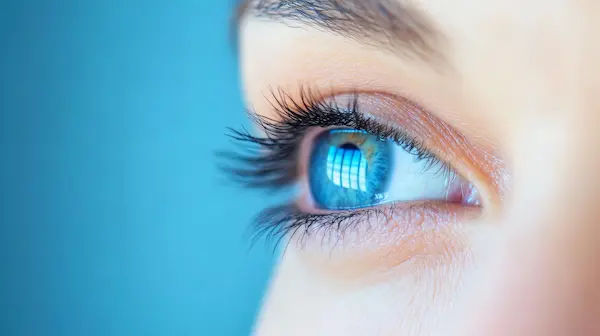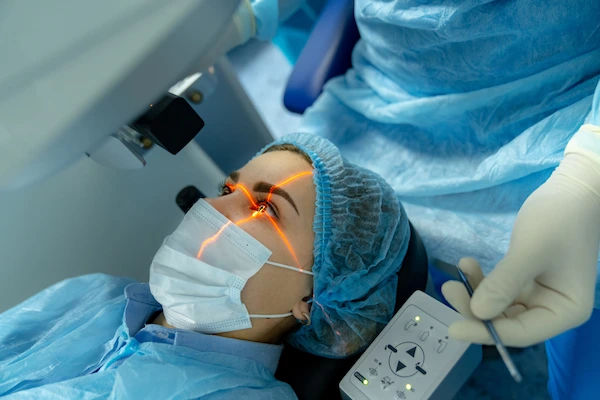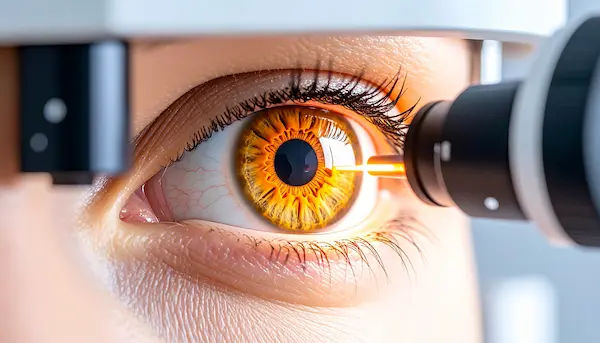Guide to Preventing Serious Eye Problems in Summer and Monsoon
Learn how to protect your eyes from seasonal risks in summer and monsoon, prevent infections, and maintain clear, healthy vision with simple, effective strategies.

Written by Dr. Md Yusuf Shareef
Reviewed by Dr. D Bhanu Prakash MBBS, AFIH, Advanced certificate in critical care medicine, Fellowship in critical care medicine
Last updated on 13th Jan, 2026

Introduction
As the seasons shift from the intense heat of summer to the relief of the monsoon, our lifestyle and environment change dramatically. While we welcome these changes, our eyes often bear the brunt of these transitions. The harsh summer sun and the humid, pathogen-filled monsoon air create a perfect storm for a range of eye problems, from minor irritations to serious infections that can threaten your vision. This comprehensive guide is designed to empower you with the knowledge to prevent these issues proactively. We will delve into the specific risks each season poses, identify the warning signs of severe conditions, and provide an actionable plan to keep your eyes healthy and comfortable all year round. Think of this as your essential handbook for navigating the seasonal challenges to your ocular health.
Why Your Eyes Need Extra Care in Summer and Monsoon
Your eyes are incredibly delicate organs, directly exposed to the elements. Understanding the unique threats posed by each season is the first step toward effective protection.
Summer's Assault: Sun, Sweat, and Dehydration
Summer subjects your eyes to a triple threat. First, UV radiation is at its peak, which can literally cause sunburn on the surface of your eye (a condition called photokeratitis) and contribute to long-term damage like cataracts. Second, increased outdoor activity and sweat can introduce salt and pollutants into your eyes, causing irritation and inflammation. Third, high temperatures and inadequate fluid intake lead to dehydration, which reduces your body's ability to produce tears, resulting in severe dry eye syndrome. This lack of protective moisture makes your eyes more vulnerable to injury and infection.
Monsoon's Menace: Humidity, Contamination, and Allergens
The monsoon brings a different set of challenges. High humidity creates a breeding ground for bacteria, viruses, and fungi. Contaminated rainwater, coupled with waterlogging, increases the risk of splashes containing harmful microorganisms entering your eyes. Furthermore, the damp environment causes a surge in mold and pollen, triggering allergic reactions in the eyes, characterised by intense itching and redness. The constant urge to rub itchy eyes can further introduce germs, leading to a secondary infection.
Consult an Ophthalmologist for the best advice
Top Serious Eye Problems to Watch Out For
Being able to identify these common seasonal eye issues is crucial for timely intervention.
Summer-Specific Threats
Here are some common seasonal eye issues to watch for, especially during summer:
Photokeratitis (Sunburn of the Eye)
This is a painful, albeit usually temporary, condition caused by excessive exposure to UVB rays. Symptoms often appear a few hours after exposure and include a gritty feeling, severe pain, redness, sensitivity to light, and even temporary vision loss. While it typically heals within 48 hours, it signifies significant damage.
Accelerated Cataracts and Macular Degeneration from UV Exposure
The cumulative effect of UV exposure is a major risk factor for more serious long-term problems. UV rays can damage the lens of the eye, leading to the early formation of cataracts (clouding of the lens). They can also harm the macula, the part of the retina responsible for central vision, contributing to age-related macular degeneration.
Monsoon-Prone Infections
Here are some common eye problems that tend to occur during the monsoon season:
Viral and Bacterial Conjunctivitis (Pink Eye)
The most common monsoon eye infection, conjunctivitis, involves inflammation of the transparent membrane (conjunctiva). Viral conjunctivitis is highly contagious, causing watery discharge and redness. Bacterial conjunctivitis often features a thick, yellow-green discharge. Knowing the difference between viral and bacterial conjunctivitis is key, as bacterial cases may require antibiotic drops.
Corneal Ulcers: A Serious Complication
A corneal ulcer is an open sore on the cornea, often resulting from an untreated infection or a minor injury that gets contaminated. It is a serious condition that can cause severe pain, redness, a white spot on the cornea, and potentially permanent vision loss if not treated aggressively and immediately.
Styes and Blepharitis Flare-ups
A stye is a painful lump on the eyelid caused by a blocked gland. The humid weather can clog these glands more easily. Blepharitis, inflammation of the eyelid margins, also flares up due to increased bacterial activity.
Year-Round Issues Aggravated by Seasons
Here are some eye issues that persist year-round but worsen with the seasons:
Severe Dry Eye Syndrome
Both seasons can exacerbate dry eyes. Summer due to dehydration and air conditioning, and monsoon because allergens can disrupt the tear film. Severe dry eye isn't just uncomfortable; it can damage the corneal surface, increasing infection risk.
Your Action Plan: 10 Powerful Prevention Strategies
Prevention is always better than cure. Here’s your definitive eye care tips plan for the seasons.
Shield Your Eyes from the Sun
Here are simple ways to protect your eyes from harmful sun exposure:
1. Wear Quality Sunglasses: Invest in sunglasses that block 99-100% of both UVA and UVB rays. Wraparound styles offer the best protection.
2. Use Wide-Brimmed Hats: A hat can block up to 50% of UV rays from reaching your eyes and the delicate skin around them.
Master the Art of Hand and Eye Hygiene
Good eye care begins with simple daily hygiene practices, such as:
1. Avoid Touching/Rubbing: This is the golden rule, especially during monsoon. If you must touch your eyes, wash your hands thoroughly first.
2. Carry a Clean Handkerchief: Use it to wipe sweat away from your forehead, not your eyes.
3. For Contact Lens Users: Be extra vigilant about hygiene. How to prevent eye infections for contact lens users involves never using water to clean lenses and considering daily disposables during high-humidity months to reduce contamination risk.
Boost Your Eye Health from Within
To keep your eyes healthy and strong, focus on these essential habits:
1. Stay Hydrated: Drink plenty of water throughout the day to support tear production.
2. Eat a Nutrient-Rich Diet: Include foods high in vitamin A (carrots, leafy greens), vitamin C (citrus fruits), and omega-3 fatty acids (fish, nuts) to strengthen your eyes' natural defenses.
3. Use Protective Eyewear: If you swim, wear swim goggles to protect against chlorine and pathogens in water.
When to Seek Professional Help: Don't Ignore These Signs
While minor irritation can often be managed with over-the-counter artificial tears, certain symptoms of a serious eye infection demand immediate medical attention. If you experience any of the following, do not delay consultation:
1. Severe pain in or around the eye.
2. Sudden change in vision or loss of vision.
3. Eye injury from a foreign object or chemical splash.
4. A thick, pus-like discharge.
5. Symptoms that persist or worsen after 24-48 hours of home care.
If your condition does not improve after trying these methods, book a physical visit to a doctor with Apollo24|7 for a comprehensive evaluation. Prompt diagnosis is critical for conditions like corneal ulcers to prevent permanent damage.
Conclusion: Enjoy the Seasons with Clear, Healthy Vision
The summer sun and monsoon rains are to be enjoyed, not feared. By understanding the specific risks to your eye health and adopting a proactive, preventive approach, you can navigate these seasons with confidence and comfort. Remember, the key pillars of protection are simple yet powerful: shield your eyes from UV rays, maintain impeccable hygiene, stay hydrated, and listen to your body. Your eyes are irreplaceable; giving them the care they deserve ensures you can continue to experience the world's beauty in all its vibrant detail. If ever in doubt about any eye symptom, seek professional advice to safeguard your precious vision.
Consult an Ophthalmologist for the best advice
Consult an Ophthalmologist for the best advice
Meghana Kotesh
Ophthalmologist
3 Years • MBBS, MS (OPTHALMOLOGIST )
Bengaluru
Apollo Medical Center, Marathahalli, Bengaluru
Dr. Padmini S
Ophthalmologist
4 Years • MBBS,MS
Bengaluru
Apollo Medical Center, Marathahalli, Bengaluru

Dr. Zennat Tajmin Shah
Ophthalmologist
24 Years • MBBS,DNB (ophthalmology)
Kolkata
Titanium Eye Care, Kolkata
Dr. Venkateswaran Sivaprakasam
Ophthalmologist
42 Years • MBBS, Diploma in Ophthalmology
Tiruvannamalai
Shiva Eye And General Hospital, Tiruvannamalai

Dr. Atheeshwar Das
Ophthalmologist
15 Years • MBBS,DO,DNB(Gold Medal),FRCS(Glasgow),FICO(UK),
Chennai
Apollo Speciality Hospitals OMR, Chennai
Consult an Ophthalmologist for the best advice
Meghana Kotesh
Ophthalmologist
3 Years • MBBS, MS (OPTHALMOLOGIST )
Bengaluru
Apollo Medical Center, Marathahalli, Bengaluru
Dr. Padmini S
Ophthalmologist
4 Years • MBBS,MS
Bengaluru
Apollo Medical Center, Marathahalli, Bengaluru

Dr. Zennat Tajmin Shah
Ophthalmologist
24 Years • MBBS,DNB (ophthalmology)
Kolkata
Titanium Eye Care, Kolkata
Dr. Venkateswaran Sivaprakasam
Ophthalmologist
42 Years • MBBS, Diploma in Ophthalmology
Tiruvannamalai
Shiva Eye And General Hospital, Tiruvannamalai

Dr. Atheeshwar Das
Ophthalmologist
15 Years • MBBS,DO,DNB(Gold Medal),FRCS(Glasgow),FICO(UK),
Chennai
Apollo Speciality Hospitals OMR, Chennai
More articles from Eye Problem
Frequently Asked Questions
1. Can I use the same eye drops for summer dryness and monsoon allergies?
Not necessarily. Summer dryness is best addressed with preservative-free artificial tears. Monsoon allergy symptoms often require specific anti-allergy eye drops. Using the wrong type can be ineffective. If symptoms persist beyond two weeks, consult a doctor online with Apollo24|7 for the correct diagnosis and prescription.
2. Is it safe to swim in pools or during rains?
Swimming pools contain chlorine which can irritate eyes. Always wear swim goggles. Avoid swimming in stagnant or flooded areas during monsoon, as the water is heavily contaminated and poses a high risk of serious eye infection.
3. What's the best way to soothe itchy eyes during monsoon allergies?
Apply a cold compress over closed eyelids for a few minutes. Avoid rubbing. Use over-the-counter lubricating drops to wash out allergens. If itching is severe, an ophthalmologist can prescribe safe anti-allergy medication.
4. Are children more susceptible to these seasonal eye problems?
Yes, children spend more time outdoors and may be less aware of hygiene practices, making them more vulnerable. Ensure they wear hats and sunglasses and teach them the importance of not rubbing their eyes.
5. How often should I get my eyes checked?
A comprehensive eye exam every one to two years is recommended for most adults. It's essential for detecting not just seasonal issues but also underlying conditions like glaucoma.




